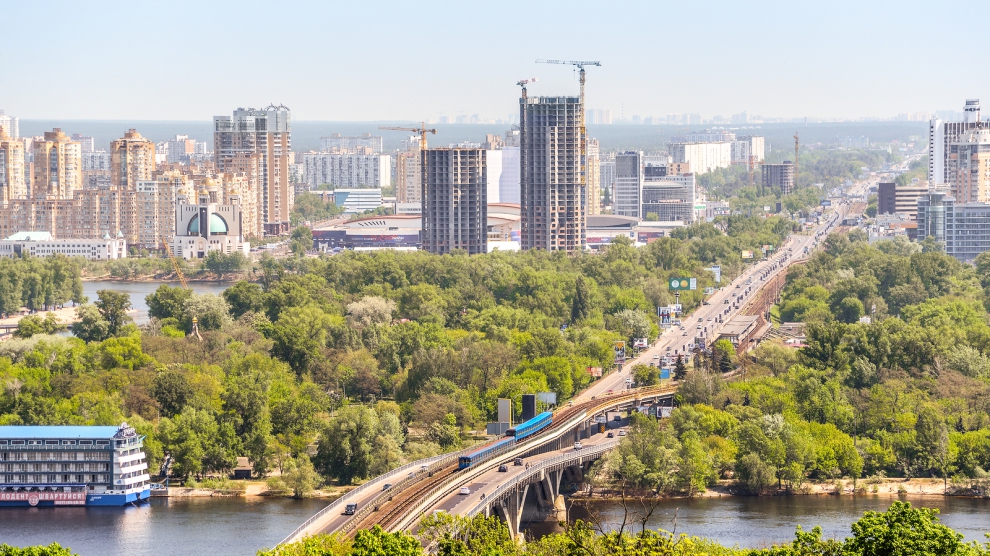Ukrainian President Volodymyr Zelensky’s so-called Big Construction programme is a much-needed overhaul of Ukraine’s ageing infrastructure. However, in the midst of the Covid-19 pandemic and facing claims of corruption, the initiative has sparked controversy.
Anybody who has driven on Ukraine’s highways knows about the state of the country’s roads.
Many highways are narrow, single-carriage affairs, riddled with potholes and populated by reckless drivers.
Roads are poorly maintained, with contractors allegedly fleecing the government and pocketing substantial sums.
- CEE risks being ‘left behind’ in e-mobility race
- New EU-Ukraine raw materials partnership puts ESG front and centre
- Czechs, Poles, Hungarians hold CEE’s most powerful passports
Alternatives are no better: some passenger trains are half a century old and announce their presence by spewing a distinctly foul smelling smoke.
With the exception of Kyiv Borispil, most airports are embarrassingly small and cramped. Stadiums across the country are in a decrepit condition while even in the capital, elegant historical buildings rot from the outside due to a complete lack of maintenance. Monuments of historical figures are regularly vandalised with vulgar graffiti, or, in some cases, defaced if they attract the chagrin of nationalists.
To address this situation, shortly after being elected in 2019, Ukrainian President Volodymyr Zelensky announced the commencement of what he dubbed the ‘Big Construction’ project. He promised to build or repair 6,500 kilometres of roads, 100 schools, 100 kindergartens, 100 stadiums and 210 hospital emergency rooms during the first year of the project.
This year, as a subsidiary of the Big Construction project, Zelensky also announced the Big Restoration project, aimed at reviving and refurbishing historical buildings and monuments. In December, the European Bank for Reconstruction and Development (EBRD) agreed to provide a 450 million euros loan to assist with construction. More recently, on June 30, Ukraine signed an agreement with China granting it access to low-interest loans for infrastructure development.
Most of Ukraine’s infrastructure was built during the Soviet era and their condition reflects that. There was hardly a problem with road congestion in the Soviet Union, so roads were built narrow. Many were constructed by German prisoners of war after World War II.
Neither was there a high volume of air travel during Soviet times, whether domestic or international.
Since independence however, this infrastructure has been almost entirely neglected. Save for a four-lane highway and high speed railway built as a condition for hosting the European football championships in 2012, large-scale infrastructure projects have been few and far between.
In rural areas in particular, the situation is dire, with some villages lacking even paved roads. Such a situation hampers economic growth and exacerbates the substantial divide between rural and urban areas in Ukraine.
As such, Zelensky’s Big Construction project was long overdue and entirely necessary. However, it has run into controversy around transparency and allocation of funds.
The first round of work on the Big Construction project took place last year, during the beginning of the Covid-19 pandemic. Parliament scraped together a special fund to combat Covid and its economic aftereffects – however, roughly half of this fund was allocated to road construction. According to the Kyiv School of Economics’ Centre of Public Finance, because of this, Ukraine spent some 4.4 billion US dollars on road construction in 2020, nearly 10 per cent of the country’s annual state budget.
Many Ukrainians have criticised the government for using funds dedicated to fighting Covid for building roads, when small businesses were going under by the hundreds. However, representatives of Zelensky’s Servant of the People party argued that the construction projects were necessary in order to re-stimulate the economy – Zelensky recently claimed that Big Construction saved 190,000 jobs over the past year.
Lack of transparency
A second source of controversy is the lack of transparency in some of the bidding for the project. Part of the initiative envisages creating a ring road around Kyiv, at a cost of 3.5 billion US dollars, to reduce the number of cars transiting through the city and to alleviate its severe congestion problem.
This project will be completed without public oversight, after legislation was passed exempting it from going through ProZorro, a platform designed to bring transparency to the procurement process. This would give Ukraine’s state road agency Ukravtodor free reign to pick a company to build the ring road, whereas it would otherwise have been obliged to select the cheapest bidder.
This has led to fears that a small “cartel” of construction companies – including the Turkish Onur Group – will monopolise the construction projects and have the freedom to milk the Big Construction cash cow.
Furthermore, Ukravtodor has a reputation for corruption: in 2019, the agency’s Polish CEO Slawomir Nowak was dismissed from his position and charged with corruption in both Ukraine and his native country.
Although a revitalisation of Ukraine’s infrastructure has been sorely needed for decades, it is unfortunate that the largest-scale infrastructure project in modern Ukraine’s history is suffering the same fate that has hampered Ukraine’s economic progress for decades.
That the tender for the Kyiv ring road is being carried out behind closed doors is undoubtedly concerning, particularly for those who thought that Zelensky’s election would represent a long-awaited departure from the pervasive corruption in the country.
Although the promised roads may yet be built, it looks likely that this would be at extremely inflated prices, thus stunting the economic stimulus that the Big Construction project would otherwise provide.
Unlike many news and information platforms, Emerging Europe is free to read, and always will be. There is no paywall here. We are independent, not affiliated with nor representing any political party or business organisation. We want the very best for emerging Europe, nothing more, nothing less. Your support will help us continue to spread the word about this amazing region.
You can contribute here. Thank you.








Add Comment